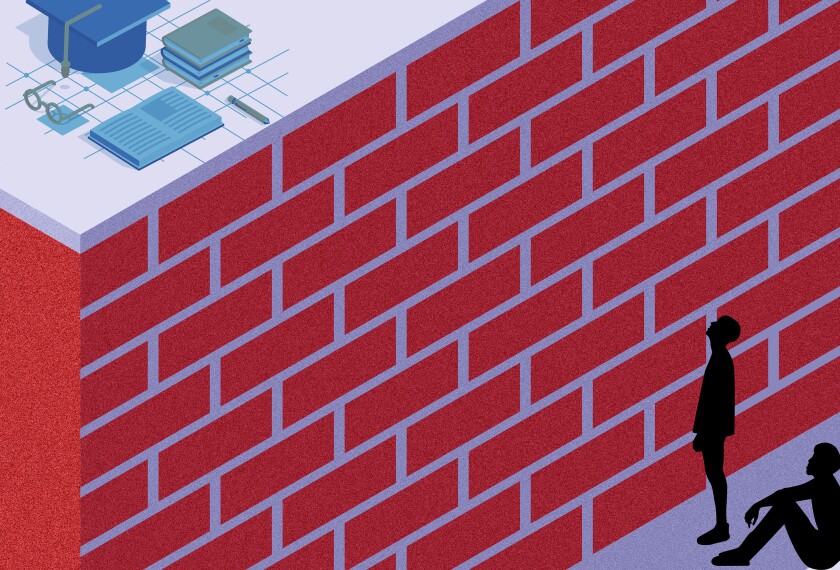Despite policymakers‚Äô continuing pledges to end ‚Äúsocial promotion,‚ÄĚ a new national study suggests that, when it comes to kindergartners, schools do more harm than good by making struggling pupils repeat a grade.
‚ÄúThis confirms what we‚Äôve known for some time from smaller-scale studies: that, by and large, retention is not a particularly helpful policy for kids,‚ÄĚ said Robert C. Pianta, an expert on early-childhood education at the University of Virginia, in Charlottesville, who was not part of the study.
is posted by the .
Published in the fall issue of the journal 91÷∆∆¨≥ß ”∆Ķal Evaluation and Policy Analysis, the report is based on extensive data collected on a nationally representative sample of young children.
The data come from a federal database known as the Early Childhood Longitudinal Study‚ÄĒKindergarten cohort, or ECLS-K, which closely tracked 12,000 public and private school children from the time they entered kindergarten in 1998 to the spring of 2000, when most were finishing 1st grade. The researchers said 471 pupils in their study sample repeated kindergarten.
‚ÄúWe took children who were actually retained, and we wanted to know what would happen if they were promoted instead,‚ÄĚ said Guanglei Hong, an assistant professor of measurement and evaluation at the Ontario Institute for Studies in 91÷∆∆¨≥ß ”∆Ķ at the University of Toronto in Canada. She conducted the study with Steven W. Raudenbush, a University of Chicago sociology professor.
To answer that question, the researchers compiled hundreds of characteristics that seemed to increase a child’s likelihood of being held back a year in school. Those included such factors as earning low scores on reading and mathematics tests, being a boy or a member of a minority group, and being younger than most of their classmates.
Then, they compared the pupils who were retained with children having similar attributes who had been allowed to go to 1st grade, often because they happened to be in schools that had different retention policies.
After two years in kindergarten, the researchers found, the retained children were about half a year behind the same types of students who were promoted. Had the grade-repeaters been promoted instead, the authors concluded, all but the very lowest-achieving among them would have learned more.
Debates over ‚Äúsocial promotion‚ÄĚ‚ÄĒthe practice of passing students to the next grade despite poor grades and test scores‚ÄĒhave roiled the political waters for decades. Prominent politicians from both Democratic and Republican political parties argue that the practice hinders efforts to improve public schools.
No Benefits Found
To explore that idea further, the researchers examined whether retention benefited high-achieving pupils who were never at risk of having to repeat a grade, presumably because they could learn at a faster pace in a class with other quick learners.
‚ÄúYou would think a 1st grade teacher would do a better job with a more homogeneous classroom,‚ÄĚ said Ms. Hong. ‚ÄúBut that did not turn out to be the case.‚ÄĚ
Average reading- and math-test scores also were no higher, the researchers found, for the schools that had social-promotion bans in place, suggesting that such policies might not help schools meet accountability requirements.
The study adds to a growing body of evidence that suggests, with some exceptions, that retaining students can have harmful effects on their schooling.
Experts said the new study took pains to account for an unusually wide range of characteristics that might make the retained children and the promoted children less comparable. ‚ÄúShort of a genuine experiment, where children are assigned by lottery to be promoted or retained, this is the best you can do,‚ÄĚ said Karl L. Alexander, a sociologist at Johns Hopkins University in Baltimore.
But he also noted that the two groups were still not exactly alike: At the end of kindergarten, the promoted pupils’ test scores, on average, were just a bit higher than those headed for retention.
What’s still unknown, he added, is how the retained students will fare later on in school, or whether retention in the upper-elementary grades has similar academic consequences.
‚ÄúThat said,‚ÄĚ Mr. Alexander concluded, ‚Äúkindergarten is a critical developmental milestone, and we need to pay attention to these findings because the results of retention can stay with these children for a long time.‚ÄĚ



